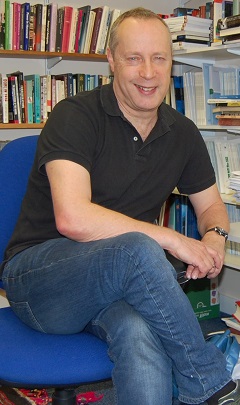Researchers call for open and respectful debate around Stanford Prison Experiment

Some of the world’s leading social psychologists, including Professor Stephen Reicher from the University of St Andrews, have called for an open and respectful debate over a controversy which has rocked the academic community.
The Stanford Prison Experiment (SPE) is one of the most famous studies in the history of psychology. Ordinary young men were divided into prisoners and guards and, very quickly, behaviours became so toxic that the study had to be ended early.
Ever since, the study has been used to show how easily people slip into roles, even if that turns them into brutes.
In recent months, however, new information about what happened in the study has provoked an impassioned debate not only within the academic world but also in the media, given the significance of the study not only to researchers but also to everyday understanding of brutal behaviour in prisons, other institutions and the world at large.
The new information suggests that the traditional accounts of the SPE underplay the extent to which the experimenters intervened in the study, that their leadership was critical to the emergent brutality of the guards and that people may not so easily slip into roles as was once thought.
Professor Reicher, Wardlaw Professor in the School of Psychology and Neuroscience at St Andrews, said: “At times, this debate has overstepped the boundary from a robust battle of ideas to personal abuse. Not only is this wrong in itself, it also impedes advances in our understanding of why and when human behaviour turns toxic.”
Now, Philip Zimbardo and Craig Haney, who conducted the SPE, have come together with Alex Haslam and Professor Reicher, who conducted another important study of how ordinary people turn brutal – the BBC Prison Study – and who have played a key role in reinterpreting the findings of the SPE, to issue a joint statement which welcomes the new information about the SPE and calls for an open and respectful debate about its implications.
Alex Haslam, Professor of Psychology at the University of Queensland, said: “When we conducted the BBC Prison Study, our main ambition was to reopen scientific debate around one of the most important issues of our time: how ordinary people can act in extraordinarily brutal ways. The new information about the SPE which has recently become public provides an unprecedented opportunity to develop debate. We must not squander that opportunity by turning a debate about ideas into a debate about personalities.”
Stephen Reicher added: “In the past, debate about the Stanford Prison Experiment was limited by the small amount of information available about what happened. Now, online archives make that information available to all. So everyone can enter the debate about how behaviour turns toxic. In today’s scientific community, where transparency is a priority, that is open science in action. It is something we think will be welcomed by ourselves, the signatories, but by the entire scientific community.”
Category Research